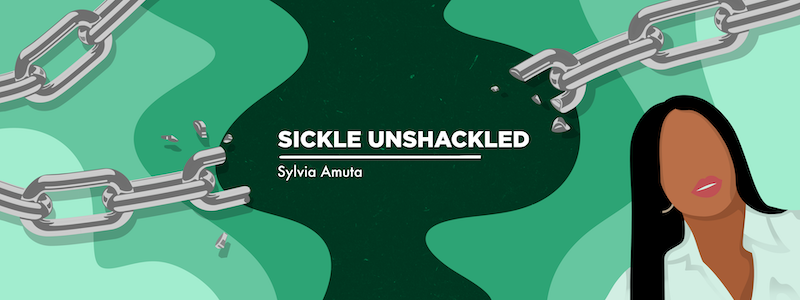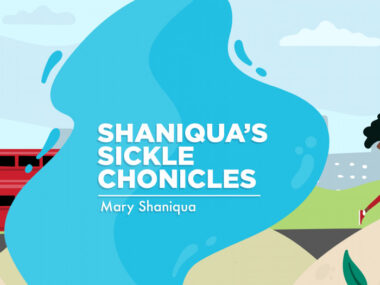A new friendship provides support for my cousin with sickle cell
There's power in connecting in person with people who truly understand
Written by |

When Ada, my cousin with sickle cell disease, came home from school one day filled with excitement, I couldn’t help but wonder what had happened. She shared that she’d made a new friend in her class and that they’d become quite close.
My attention was piqued when Ada, whom I care for, mentioned this new friend had missed several days of school, leaving her visibly concerned. I found it odd that a child who’d joined the school late in the session was already absent. Normally, I would’ve dismissed these concerns, but my cousin’s worry was palpable. So I suggested she talk to her teacher to see if they could find out what was going on.
The next day, Ada returned with news from her teacher that her friend was ill.
The opportunity to learn more about her friend’s situation presented itself unexpectedly when I encountered her friend’s mother during one of my routine pickups from school. Our introduction led to a heartwarming conversation, in which she shared that her daughter had sickle cell anemia. This condition was the primary reason for their move to our community — seeking proximity to family members who could provide support during her daughter’s frequent health crises. Their previous residence lacked this essential support network, making their challenges even more overwhelming.
This conversation struck a chord with me, as it mirrored my cousin’s experiences, and we began sharing stories. It felt comforting to speak to someone who understood sickle cell challenges firsthand. I was relieved that Ada not only had a friend, but someone who could relate to her struggles.
With her friend’s mother’s consent, I explained to Ada that her friend had a similar health path, and I encouraged Ada to consider openly communicating with her friend about their shared experiences. This opened the door for them to support each other, share advice, and check in regularly. It was heartwarming to see how they’ve bonded over their shared experiences with sickle cell. Having someone who understands what you’re going through can make you feel less alone and provide invaluable support.
I realized that while virtual communities are beneficial, having in-person connections with people who truly understand us is essential, especially for children who may not have access to the internet. I’m grateful for the friendship blossoming between Ada and her friend, and I hope it continues to grow stronger, providing them with mutual support and understanding during challenging times. This tale also serves as a hopeful sign for everyone, showing how important it is to find and keep relationships that help and uplift us through tough times.
Note: Sickle Cell Disease News is strictly a news and information website about the disease. It does not provide medical advice, diagnosis, or treatment. This content is not intended to be a substitute for professional medical advice, diagnosis, or treatment. Always seek the advice of your physician or other qualified health provider with any questions you may have regarding a medical condition. Never disregard professional medical advice or delay in seeking it because of something you have read on this website. The opinions expressed in this column are not those of Sickle Cell Disease News or its parent company, Bionews, and are intended to spark discussion about issues pertaining to sickle cell disease.





Debra Flake
My daughter has SCD which was instrumental in her deciding to become Dr. Tai sh Malone LPCS. She is a Texas therapist who specializes in chronic illness and management. After 12 years of working with several work-taxing companies, she decided to venture on her own. Starting Delicately Balanced Therapy allows her more control over her workday and allows her to rest frequently and work from home when ill. Unfortunately, she is in the beginning stages of her business and cannot afford health insurance which is detrimental to her health. Relying on Holistic measures is a big concern for adults with SCD or any chronic illness; finding adequate healthcare and employers that understand your health complications is difficult. I would like feedback from individuals who have information on affordable healthcare programs.
Naty Alvarez
If there are any sickle cell warriors and loved ones in California looking for support, the Sickle Cell Disease Foundation has amazing programs and services available.
Floretta Obrien
My granddaughter has SSD and I welcome forums that discuss this important topic. When she was last hospitalized, I encouraged here to speak to her roommate, who also has SSD, and I hope they've formed a bond. Although my granddaughter is pretty independent and manages well, I know the value of being able to share with someone who knows exactly what you are going through. I hope that they stay in touch with each other and I welcome a forum like this one to provide invaluable information to the sickle cell community! Thank you!
sylvia
It's great to hear about your granddaughter finding a connection because having someone to share experiences with is very helpful. Thanks for your comment.
A Rodgers
This article is very uplifting. I am caregiver for my daughter who has Sickle Cell Anemia. I am also trying to have my daughter see these posts.
sylvia
I'm glad you found the article uplifting. Wishing you and your daughter strength and positivity on your journey.